As of 13:51 CDT, the official temperature at O'Hare hit 26°C, passing the previous March 14th record by a degree. Will it get warmer?
The high temperatures at O'Hare the last three days have been
21°C,
18°C, and
21°C, all of them very close to the normal temperatures for mid-May. Right now it's 21°C, and forecasters expect record temperatures today and tomorrow (with a brief interlude tomorrow afternoon as temperatures plummet 11°C for a few hours).
The record high for March 14th is 25°C, set in 1995, during Chicago's longest string of 21°C-plus temperatures in history (5 days, from March 12 to 16). With a forecast (record!) high of 27°C tomorrow (beating the record of 23°C, also set in 1995), it's more like June than March.
Not to beat the drum or anything, but warm springs usually lead to really hot summers. Expect whinging from The Daily Parker in about two months.
Yesterday, probably when I got on the bus going home, I lost my Starbucks card and a credit card. I have another card on the same account, but with a different number, that I keep out of my wallet in case something like this happens. As soon as I discovered the missing credit card, I called the issuer's customer service line, and...you can see where this is going, right?
Yes, they closed the card I still had and left the lost one open. I discovered this a few minutes ago. Fortunately, the person I talked to just now understood what I was saying, saw what had happened, and is now sending both replacement cards overnight. (The haste is required because I'm going to the UK this weekend, and I need at least one credit card overseas.)
So, points to the issuer for correcting a mistake expeditiously. That just about evens out my frustration this morning trying to get coffee.
Oh, and about that trip to the Land of Uk: it's a pretty quick weekend, courtesy of ridiculously low fares from American Airlines earlier this year. I also scored a ticket on the Eurostar Saturday for £49.50 outbound, which was too good to pass up. I'm so looking forward to the weekend. I just hope I have at least one credit card to use...
The United Kingdom has no Constitutional prohibition against established religion; in fact, the head of state is also the head of the church. But the UK has a much deeper secular grain than we have, to the extent that many people in the country get quite exercised about even public prayer. The Washington Post explains the latest row:
Local lawmaker Clive Bone, an atheist, was backed by four of his peers in challenging the long-standing tradition of opening public meetings with blessings by Christian clergy. After losing two council votes on the prayer ban, Bone took the town to court — winning a ruling last month that appeared to set a legal precedent by saying government had no authority to compel citizens to hear prayer.
Bone, a transplanted Londoner and retired management consultant who has given up his seat on the council, said: “This isn’t about freedom of religion. I will defend their right to pray in their churches to my dying breath. Just don’t make us listen to it anymore. It is a backwards tradition that alienates people in this country.”
Most people I know in the UK say religion is entirely private, and would likely be offended at having to listen to prayers at minor public meanings. It's yet another example of how really out of step the rest of the Western world are with us.
As I mentioned last night, the U.S. Census Bureau uses a different algorithm to estimate world population than the U.N. So despite all the stories last October about the U.N.'s population estimate hitting 7 billion, the Census estimate hit 7 billion...about 20 seconds ago:
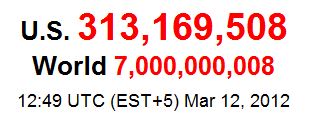
Thanks for playing. Check back in about 12 years for the 8th billion mark.
Back in October, the United Nations declared that the world population had hit 7 billion. The U.S. Census Bureau, however, believes differently. Here are the World and U.S. population clocks from a moment ago:
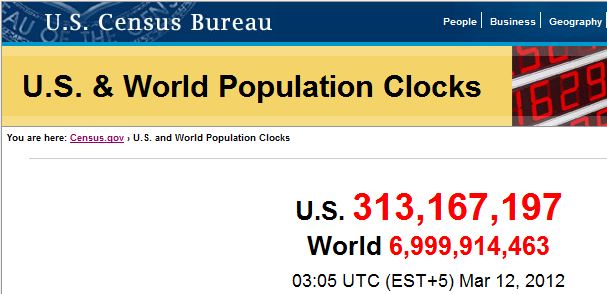
So, as far as the Census is concerned, we'll hit 7 billion tonight sometime.
That the Census didn't update its estimates to match the U.N.'s suggests they're confident of their more conservative model.
I've never felt great about the Daylight Saving Time switch happening in the beginning of March, but here it is. Oddly, I have no trouble changing eleven or twelve time zones, but the one-hour change in the spring (but not the fall) always messes me up.
Anyway, if you live in the U.S. or Canada (excluding Arizona and Saskatchewan), it's probably an hour later than you think it is.
In general, people using words they don't understand, presumably to sound smart, drives me up a tree. In specific, I wish against reason that more people knew how time zones worked. Microsoft's Raymond Chen agrees:
One way of sounding official is to give the times during which the outage will take place is a very formal manner. "The servers will be unavailable on Saturday, March 17, 2012 from 1:00 AM to 9:00 AM Pacific Standard Time."
Did you notice something funny about that announcement?
On March 17, 2012, most of the United States will not be on Standard Time. They will be on Daylight Time. (The switchover takes place this weekend.)
Now, I'm one of the few people in the world who has implemented a complete time zone package for Windows systems, and regular readers will already know about my vocal defense of the Olson/IANA time zone database. So I don't expect most people to know the ins and outs of time zone abbreviations. But this is the point Chen makes, and I would like to make: if you don't know what you're writing, don't write it. Say "Central time" or "local Chicago time" instead of "Central Standard Time," if for no other reason than you'll be wrong about the latter 8 months out of the year.
Two days each week I have to go out to a client's office about 40 km from home. Only one route works to get me there, and that route includes the infamous Eisenhower Expressway (I-290) leading to the west from the Chicago Loop.
In the last few years, though, the Illinois Dept. of Transportation and neighboring agencies have created Travel Midwest, which has vast stores of traffic data. This has helped me stay sane. The site allows you to query the database to find out, in simple visual charts, when traffic is worst.
This chart compares my morning commute from the Circle Interchange to Wolf Road (22½ km). The red line shows travel times Monday through Thursday; blue line shows Friday times. (The data are from the last 12 months.) This shows why I hit the road around 8:30, instead of earlier, which gets me to the Eisenhower around 9 and here by 9:30:
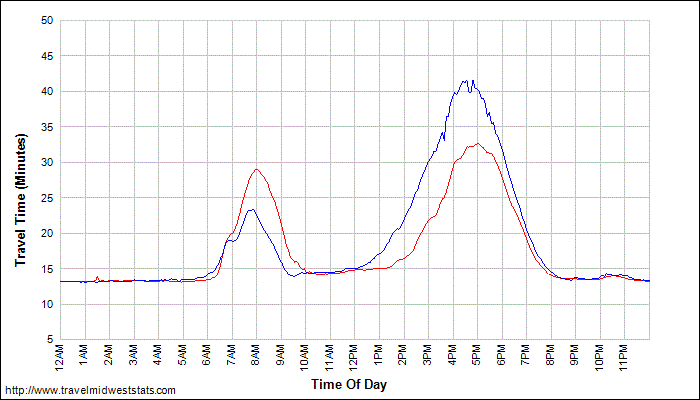
But here's the return trip; again, Monday-Thursday is red and Friday is blue:
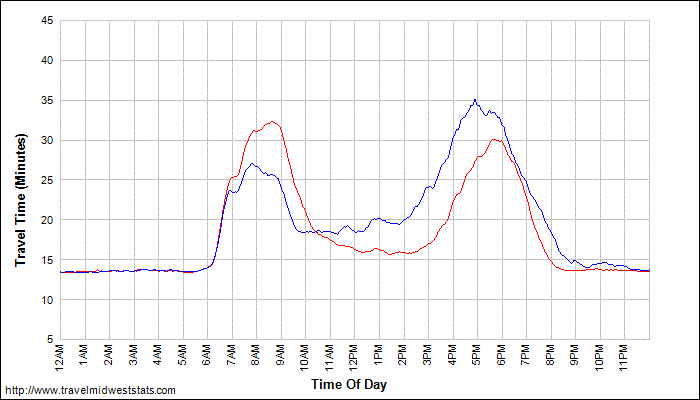
Then there's the chart going the opposite direction right now:
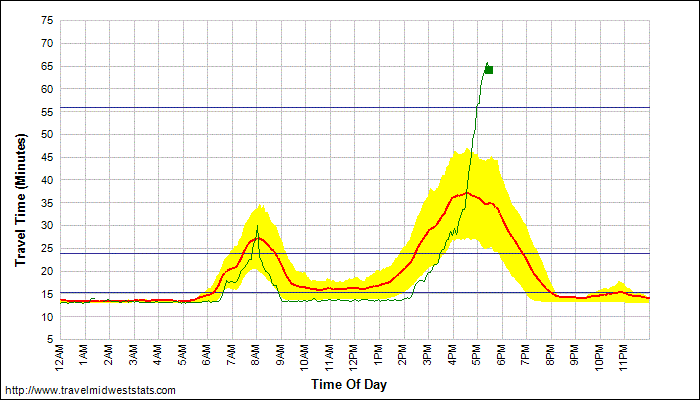
In the chart above, the thick red line shows the mean travel time, and yellow area shows 1 standard deviation on either side of the mean. The lines at 15, 23, and 56 minutes represent 88 km/h (full legal speed), 56 km/h, and 24 km/h. At the moment, the 65-minute travel time means traffic is moving at the breakneck speed of 20.6 km/h, which most bicyclists would find a relaxing speed.
I think I'll stay put for a while. Damn.
Having this information makes it relatively easy not to travel when everyone else is on the road. Yeah, I get home a little later, but the cost to me of spending 30 minutes in slow traffic is higher than the cost of shifting my commutes an hour forward.
Atlantic Cities contributor Feargus O'Sullivan reports from London on the city's preparations for, and apprehension about, this summer's games:
As a recent survey by pollsters ComRes showed, public ambivalence still reigns, with only a third of respondents agreeing that the Olympics were worth the money. Londoners in particular are anticipating the games with more dread that excitement. With a heavy tax bill and an already stretched transport system, it’s easy to see why they’re feeling curmudgeonly. The city’s roads are routinely clogged as it is, and many fear planned Olympic lanes for athletes and VIPs on major routes will make congestion unmanageable, driving people out of cars and into a temperamental subway system that already makes the average sardine can look roomy. Add to this London’s role as a prime target for international terror and you’re looking at a long hot summer of tension and stress.
But while some fear that the games will make the city a living hell, others are predicting the opposite – that Olympic price hikes will leave London empty and that tourist revenues will plummet. In December, the European Tour Operators Association warned that the games are already deterring regular sightseers, with hotel bookings down by a fifth compared to the same period last year. Musical theater composer Andrew Lloyd Webber, meanwhile, has said advanced bookings for London’s theaters are so bad for the summer that the sector “faces a bloodbath." Given these two contradictory extremes of anxiety, it’s hardly surprising that the official response to such pre-games jitters has been one of bullish confidence, with London’s eccentric mayor Boris Johnson memorably dubbing Olympic skeptics “Gloomadon poppers."
I, for one, plan to avoid London from June to September this year. But I'm going next week, and while there I'll check out the stadium and the public's mood. Remember, many of us Chicagoans didn't want to bid on 2016 because of the mess we thought it would bring to our city. Let's see how London does.